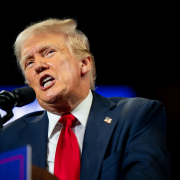Trump’s WAR on Civil Rights Unprecedented
By Esther Claudette Gittens
In the initial days of his second term, President Donald J. Trump has enacted a series of executive orders that have profound implications for civil rights in the United States. These directives, often framed as efforts to promote “merit-based opportunity” and eliminate “radical” diversity, equity, and inclusion (DEI) initiatives, have been criticized for undermining decades of progress in civil rights and equality.
Rescinding Executive Order 11246
One of the most significant actions taken by the administration is the rescission of Executive Order 11246, originally signed by President Lyndon B. Johnson in 1965. This order prohibited federal contractors from discriminating based on race, color, religion, sex, sexual orientation, gender identity, or national origin, and mandated affirmative action programs to promote equal employment opportunities. The Trump administration’s revocation of this order is justified as a move to eliminate “radical and wasteful” DEI programs, arguing that such requirements foster “preferential treatment” and deviate from merit-based hiring practices. Critics, however, contend that this action could reverse decades of progress in promoting equal employment opportunities and addressing systemic discrimination.
Defining Gender and Restricting LGBTQ+ Protections
Another executive order, titled “Defending Women From Gender Ideology Extremism And Restoring Biological Truth To The Federal Government,” establishes strict binary definitions of sex and mandates their use across federal agencies. This order defines sex as an “immutable biological classification” determined at conception and explicitly separates it from gender identity. It directs federal agencies to enforce sex-based rights and protections using these definitions, impacting policies related to identification documents, healthcare, and housing. The order also prohibits the use of federal funds to promote “gender ideology” and mandates the removal of related content from federal communications. Advocacy groups have condemned this move, arguing that it erases federal recognition of transgender individuals and undermines their rights.
Eliminating Diversity, Equity, and Inclusion Programs
The administration has also targeted DEI programs within federal agencies and among federal contractors. An executive order titled “Ending Illegal Discrimination And Restoring Merit-Based Opportunity” directs all executive departments and agencies to terminate all “discriminatory and illegal” DEI preferences, mandates, policies, programs, activities, guidance, regulations, enforcement actions, consent orders, and requirements. It further orders agencies to enforce existing civil-rights laws and combat private-sector DEI initiatives deemed discriminatory. This move has led to the termination of DEI offices, positions, and programs within the federal government, as well as the rescission of equity-related grants and contracts. Critics argue that these actions represent a deliberate attempt to undo progress on diversity, equity, inclusion, and accessibility, creating new barriers to opportunity.
Impact on Transgender Rights
The administration’s actions have had a particularly profound impact on transgender individuals. Executive orders have been issued to ban transgender service members from the military and restrict access to gender-affirming care for minors. The Department of Education has informed its employees that it will eliminate programs and policies that “do not affirm the reality of biological sex,” putting at risk support programs for transgender students, such as assistance for homeless students and mental health services in schools. Additionally, the State Department has suspended applications seeking a sex-marker change or a nonbinary “X” sex marker on passports, and the Social Security Administration has removed its pages on gender identity and changing sex identification. These actions have been met with legal challenges from advocacy groups, arguing that they violate constitutional rights and existing anti-discrimination laws.
Legal Challenges and Opposition
In response to these executive orders, several groups, including the American Civil Liberties Union (ACLU), Lambda Legal, and the Human Rights Campaign, have filed lawsuits challenging their constitutionality. These legal actions argue that the orders represent a deliberate attempt to undo progress on diversity, equity, inclusion, and accessibility, creating new barriers to opportunity. Critics assert that the administration’s actions demonstrate a profound hostility to civil rights and many of the programs and policies that protect the rights of millions of Americans every day.
In summary, the Trump administration’s recent executive orders represent a significant shift in federal policy concerning civil rights, diversity, and inclusion. While the administration frames these actions as efforts to promote merit-based opportunity and eliminate discriminatory practices, critics argue that they dismantle essential protections and reverse decades of progress in civil rights. The legal and societal implications of these actions are likely to be the subject of ongoing debate and litigation in the months and years to come.












Leave a Reply
Want to join the discussion?Feel free to contribute!